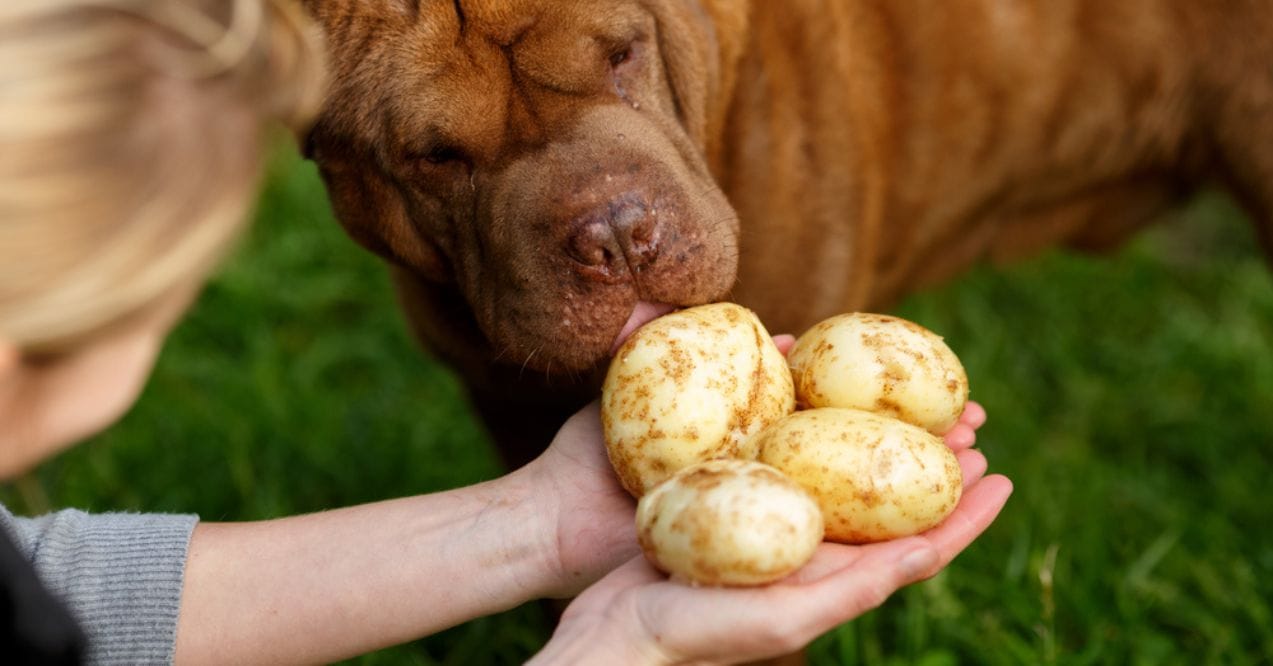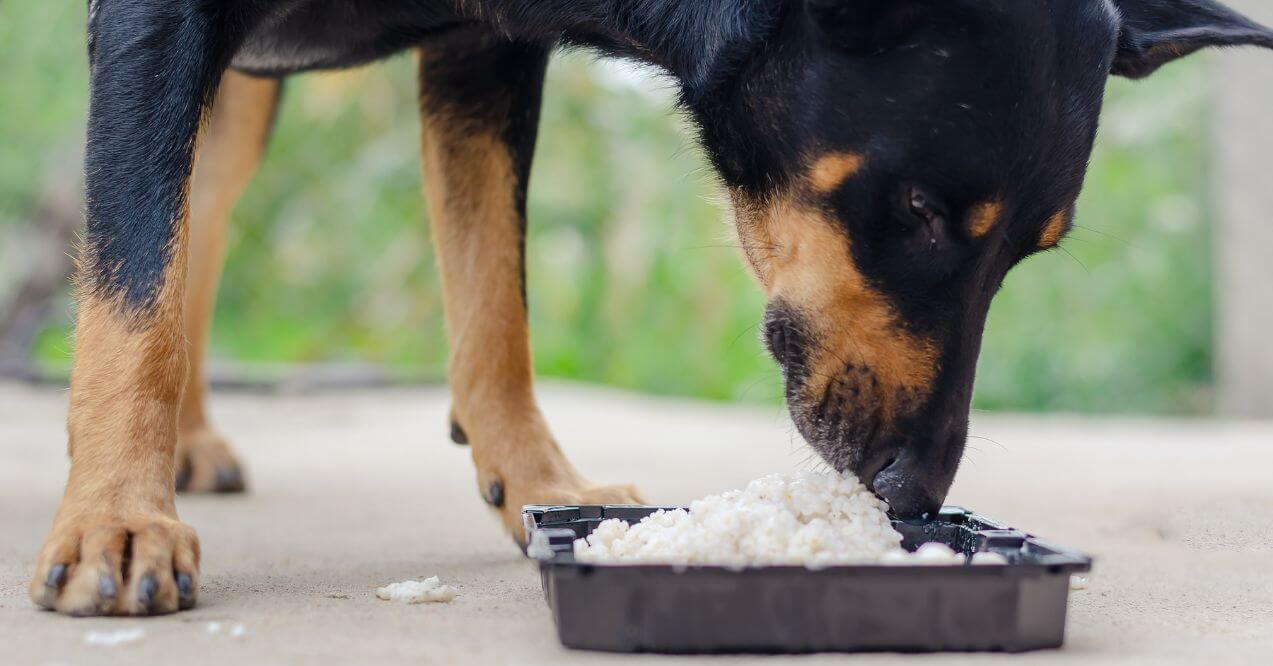What Can I Give My Dog for an Upset Stomach?
Many dog owners face the challenge of helping their furry friends through tummy troubles. So, what can I give my dog for an upset stomach? Luckily, there are numerous options for what to give a dog with an upset stomach. From dietary adjustments to natural remedies, let’s explore effective ways to soothe your pup’s digestive discomfort.
How a Happy Belly Starts with the Right Diet
The path to recovery often begins with what’s in your dog’s bowl. Adjusting your pup’s diet can work wonders for their digestive system. Temporary changes to softer, blander foods can ease symptoms and prevent further discomfort.
Different dogs have different needs. Smaller breeds might do better with lighter, more frequent meals, while larger dogs might need a bit more substance. The key is to observe your dog’s response and adjust accordingly.
What to Feed a Dog With an Upset Stomach

Let’s explore some upset stomach friendly options that can help your furry friend feel better:
Slurp-Worthy Hydration Foods
Keeping your dog hydrated is vital when they’re not feeling their best. Try these water-rich options:
- Watermelon (in moderation)
- Cucumbers
- Low-sodium broth
Bone broth is a superstar in the world of canine hydration. It’s not only tasty but also packed with collagen and glycine, which can support digestive recovery. Here’s a quick recipe:
- Simmer dog-safe bones in water for 24 hours
- Remove bones and strain the broth
- Let it cool and skim off any fat
- Serve in small portions or freeze into ice cubes for a cool treat
Gentle Proteins for Picky Tummies
When your dog’s stomach is sensitive, opt for these easy-to-digest proteins:
- Boiled chicken and white rice – A classic combo that’s gentle on the tummy
- Scrambled eggs – Prepare without butter or oils for a light protein source
- Turkey or fish – Lean options that provide necessary nutrients without overwhelming the digestive system
Probiotics for a Happy Belly
Probiotics can help balance your dog’s gut bacteria, aiding digestion and restoring gut health. They support a healthy digestive system, improve nutrient absorption, and may even help with immune function.
Recognizing the signs your dog needs probiotics can help determine whether it’s time to introduce them into their diet. If your dog shows any of these symptoms, incorporating probiotic-rich foods may help restore balance and improve digestion.
Try these probiotic-rich options:
- Plain, unsweetened yogurt (in moderation)
- Specialized dog probiotics (available as supplements)
- Kefir
- Dog-safe fermented vegetables (like a small amount of sauerkraut)
Introduce these gradually and watch for any signs of lactose intolerance.
Potatoes
Potatoes can be a soothing addition to your dog’s upset stomach diet:
- Sweet potatoes – Mash them up for a fiber-rich, energy-releasing option
- White potatoes – Boiled or mashed, they provide gentle energy without irritating the stomach
Pumpkin
Pumpkin is a go-to for many dog owners dealing with tummy troubles. Its fiber content can help with both constipation and diarrhea. Use canned pumpkin (unsweetened, no additives) and adjust the portion based on your dog’s size:
- Small dogs: 1-2 teaspoons
- Medium dogs: 1-2 tablespoons
- Large dogs: 2-3 tablespoons
Baby Food
Simple, meat-based baby food can be a good temporary option. It’s easy to digest and great for hiding medications if needed. Just be sure to avoid any varieties with onions, garlic, or spices.
Superfoods to Keep Your Dog’s Belly Happy Long-Term

While the above options are great for immediate relief, some foods can help maintain digestive health over the long term:
Goat’s Milk
Goat’s milk is rich in natural probiotics and digestive enzymes, making it a great addition to your dog’s diet for ongoing gut health.
Cottage Cheese
Low in fat and high in protein, cottage cheese is easy to digest and can be mixed with other bland foods like rice. Start with small amounts based on your dog’s size.
Boiled or Steamed Carrots
Carrots are fiber-rich and can help firm up stools. Boil or steam them until soft, and offer in small, dog-sized portions.
Plain Applesauce
Unsweetened applesauce is hydrating and fiber-rich, helping to regulate digestion. Ensure there are no added sugars or flavorings, and offer appropriate portions based on your dog’s size.
Natural Options for a Dog’s Upset Stomach
Sometimes, your pup needs a little extra help. Try these holistic and natural remedies for dog upset stomach:
Time for a Tummy Timeout
A short fast can give your dog’s digestive system a chance to rest and reset. The duration depends on your dog’s size and health condition:
- Small dogs: 12-24 hours
- Medium to large dogs: Up to 24 hours
Fasting isn’t suitable for puppies, pregnant dogs, or those with certain health conditions. Always consult your vet before fasting your dog. During the fast, ensure your dog has access to fresh water to prevent dehydration. After the fasting period, gradually reintroduce small, bland meals to avoid overwhelming the digestive system.
If you’re looking for additional ways to ease your dog’s stomach discomfort, including hydration strategies and soothing techniques, check out how to help a dog’s upset stomach for tips on digestive relief.
Ginger
Ginger can help ease nausea and digestive issues. Try these methods:
- Ginger tea – Steep fresh ginger in hot water, cool, and offer small amounts
- Powdered ginger – Sprinkle a pinch over your dog’s food
For larger dogs, you can offer up to 1 teaspoon of fresh grated ginger root per day. Start with smaller amounts and observe your dog’s reaction. Some dogs may not enjoy the taste, so you might need to mix it with something more appealing, like a small amount of plain yogurt or pumpkin puree.
Slippery Elm
Slippery elm bark can coat and soothe the digestive tract. Make a simple gruel by mixing powdered slippery elm with water, and offer small amounts before meals.
The general dosage is about 1/4 teaspoon of powder per 10 pounds of body weight.
You can mix it with a bit of warm water to create a paste, or add it to your dog’s food. Slippery elm can be given up to four times daily and may help with both diarrhea and constipation.
Chamomile Tea
Chamomile tea can have a soothing effect on your dog’s stomach. Brew a weak tea, let it cool, and offer small amounts. You can also mix it with a bit of low-sodium broth for added appeal.
For small dogs, offer 1-2 tablespoons of cooled tea, while larger dogs can have up to 1/4 cup.
Chamomile not only helps with digestive issues but can also have a calming effect, which may be beneficial if your dog is feeling anxious due to stomach discomfort.
Oats and Oatmeal
Oats provide a gentle source of fiber that can help regulate digestion. Prepare plain oatmeal with water (no milk or sugar) and let it cool before serving.
Start with small portions, about 1 tablespoon for small dogs and up to 1/4 cup for larger breeds.
Oatmeal can help bind stools in cases of diarrhea and provides an easily digestible source of carbohydrates for energy. You can mix in a bit of pumpkin or plain yogurt for added flavor and digestive benefits.
Chia Seeds
Chia seeds can help firm up loose stools and provide added nutrients. Soak them in water before adding to your dog’s food, and introduce them gradually to avoid digestive upset.
Start with 1/4 teaspoon for small dogs and up to 1 teaspoon for larger breeds.
Chia seeds are rich in omega-3 fatty acids, which can help reduce inflammation in the digestive tract. They also absorb water, forming a gel-like substance that can help slow digestion and promote more formed stools.
Cool Ice Cube Treats
Ice cubes can be a refreshing way to keep your dog hydrated when they’re not feeling well. Try freezing low-sodium broth or chamomile tea for a soothing, hydrating treat. Always supervise your dog when offering ice cubes to prevent choking. For smaller dogs, you can crush the ice cubes into smaller pieces.
These frozen treats not only help with hydration but can also provide a distraction and comfort for dogs feeling under the weather. You can even make larger ice pops using silicone molds for a longer-lasting treat.
Conclusion
In the end, what can you give to a dog for upset stomach? When your dog has an upset stomach, the right diet and natural remedies can make all the difference. From hydrating foods to gentle proteins and soothing herbs, there are many options for what to give a dog for an upset stomach.
Introduce new foods gradually and always consult with your vet if symptoms persist or worsen. With a little care and the right approach, you can help your furry friend get back to their happy, tail-wagging self in no time!
Bland, easily digestible options are best: boiled chicken with white rice, pumpkin puree, bone broth, and small amounts of plain yogurt. Gradually introduce these in small portions. Always ensure fresh water is available for hydration.
Seek veterinary care if vomiting or diarrhea persists for over 24 hours, there’s blood in vomit or stool, signs of dehydration appear, your dog shows abdominal pain, refuses food for over 24 hours, or develops a fever.
Yes, it’s common for dogs to eat grass when feeling nauseous. While not always harmful, excessive grass-eating can indicate digestive issues. Monitor the behavior and consult your vet if it persists or is accompanied by other symptoms.
Small amounts of plain, unsweetened yogurt can provide beneficial probiotics. However, many dogs are lactose intolerant. Avoid milk and other dairy products as they can worsen digestive issues. Always introduce new foods gradually and in moderation.
Advertisement. This site offers health, wellness, fitness and nutritional information and is designed for educational purposes only. You should not rely on this information as a substitute for, nor does it replace, professional medical advice, diagnosis, or treatment. If you have any concerns or questions about your health, you should always consult with a physician or other health-care professional. Do not disregard, avoid or delay obtaining medical or health related advice from your health-care professional because of something you may have read on this site. The use of any information provided on this site is solely at your own risk.



















